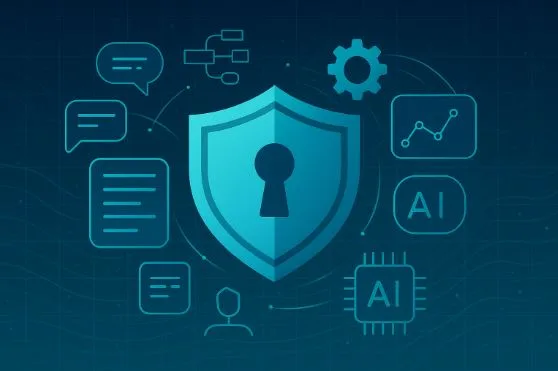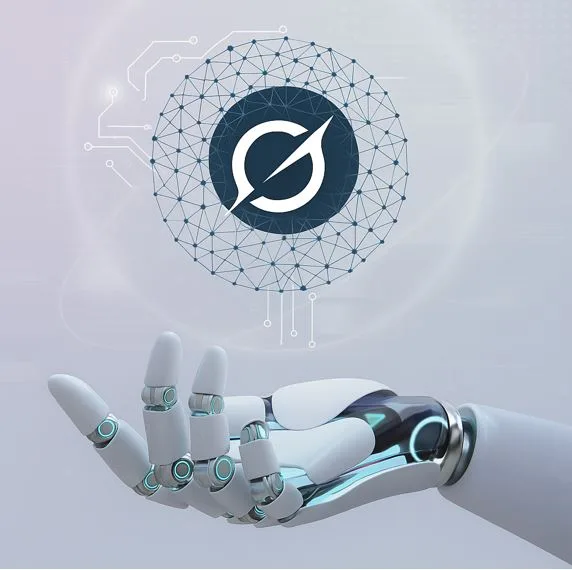Why Privacy Matters More Than Ever in the Age of AI Automation
AI is becoming as ordinary and essential as electricity—powering our writing, planning, communication, customer service, analytics, and decision-making. But while AI makes work faster and life more convenient, its quiet expansion comes with a critical question:
Who protects your privacy when AI is everywhere?
The image above captures this moment perfectly: a single person, surrounded by AI-driven tools, trying to stay productive while shields of “security” float around them. But the truth is far more complicated. As AI becomes our digital coworker, the volume of information we expose—knowingly or unknowingly—continues to grow.
Privacy is no longer just a personal choice. It is a digital survival skill.
Here’s why privacy matters more than ever in the age of AI automation—and what individuals and businesses can do to stay protected.
1. AI Systems Process More Private Data Than Most People Realize
Whenever you use an AI tool to summarize a document, draft a contract, plan a project, or brainstorm ideas, you’re sharing much more than text. You may be exposing:
- Personal identifiers
- Internal business plans
- Financial data
- Client materials
- Work documents
- Screenshots
- Private conversations
Imagine this: You upload a client agreement into an AI assistant to “make it easier to digest.” It feels harmless—but that document may pass through multiple servers and logging systems before the result appears.
In the age of AI, convenience comes with invisible data trails.
2. AI Automation Creates Longer, More Complex Data Pipelines
Traditional apps exchange data in simple loops. AI tools, however, operate in multi-layered ecosystems involving:
- Cloud inference engines
- Large model-hosting servers
- Third-party API calls
- Telemetry and analytics systems
- Background logs and caches
Sometimes, a single AI prompt travels through several providers before returning an answer. This complexity increases the number of systems that see your request, the amount of metadata generated, and the number of potential exposure points.
AI makes work easier—but it also expands the privacy perimeter far beyond your device.
3. Metadata Leakage: The Privacy Risk People Don’t See Coming
The most important privacy problem today isn’t always the content you share—it’s the metadata that surrounds it.
Metadata includes when you’re active, how long sessions last, what devices you use, your geographic signals, and the frequency of your queries. Even without reading your content, metadata can reveal:
- Your identity and job role
- Work habits and travel routines
- Project timelines
- Business interests
- Pain points or strategic priorities
AI tools generate far more metadata than normal web browsing because each prompt triggers multiple backend operations. To an attacker, metadata is a detailed behavioral blueprint—and it’s often unprotected.
4. Remote Work Makes AI Privacy Even More Fragile
Most AI usage now happens outside secure office networks—on home Wi-Fi, in cafés, at airports, and via public hotspots. These environments often rely on:
- Outdated routers
- Mixed personal and work devices
- Weak passwords and unencrypted DNS
- Insecure IoT devices
A simple example: A remote worker uploads a confidential spreadsheet to an AI tool using a café Wi-Fi network. Even if the content is encrypted, the metadata says enough: “Here’s someone accessing sensitive business resources from a public hotspot.”
This is why many companies now require encrypted access tools. Services like X-VPN help shield AI traffic on untrusted networks by encrypting both content and metadata, ensuring that your connection doesn’t betray your activity.
5. AI Automation Introduces New Categories of Privacy Risk
AI brings entirely new threats that didn’t exist before:
- Inference attacks: Hackers can sometimes infer private data from the output patterns of AI models.
- Cross-application leakage: Apps connected to multiple AI services may unintentionally expose shared metadata.
- Shadow data accumulation: AI platforms may store snippets of sensitive content in logs, histories, or caches.
- Automated overreach: AI tools can access folders, emails, or systems users didn’t realize were integrated.
- Behavioral profiling: Your habits become a data asset for advertisers, analytics engines, or cybercriminals.
These risks are growing faster than traditional security policies can adapt.
6. Businesses Face New Responsibilities in the AI Privacy Era
Businesses adopting AI tools must rethink data protection from the ground up. Regulators increasingly expect organizations to manage AI data flows, employee usage, metadata exposure, and remote access protections.
A privacy flaw—even one caused by a worker using AI from home—can result in fines, legal exposure, insurance disputes, and client distrust. AI productivity comes with compliance obligations that companies can’t ignore.
7. Practical Ways to Protect Privacy in an AI-Driven World
Privacy protection doesn’t need to be complicated. A few simple habits make a massive difference:
- Encrypt your connections: Use a secure VPN (especially on home or public networks).
- Minimize data sharing: Avoid uploading full documents when a summary or generic text will do.
- Separate environments: Use different browsers or profiles for work and personal AI use to prevent cross-contamination.
- Enable encrypted DNS: Stops third parties from tracking which AI tools you access.
- Review settings: Most platforms allow you to disable history or clear logs—use these features.
Conclusion: AI Is Inevitable—Your Privacy Practices Should Be Too
AI automation is here to stay. It boosts productivity, accelerates workflows, and solves problems at incredible speed. But it also increases exposure through more data, more metadata, and more complex digital footprints.
The future of privacy won’t be defined by AI companies or governments alone. It will be shaped by the everyday choices made by users and businesses.
In the AI age, protecting your privacy means protecting your identity, your work, your clients, and your future.
AI is powerful—but your privacy should be stronger.



